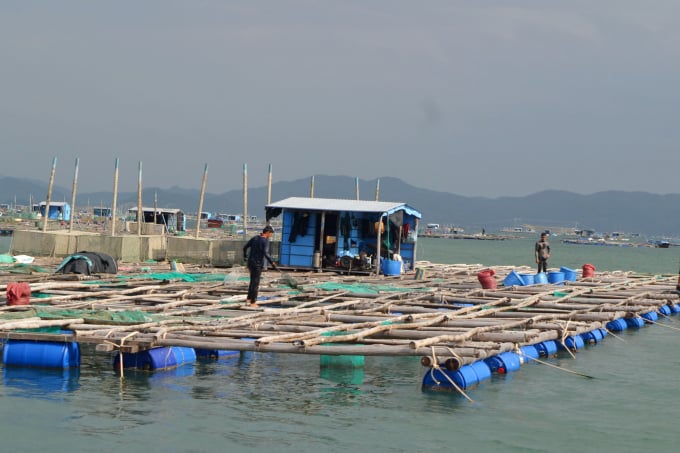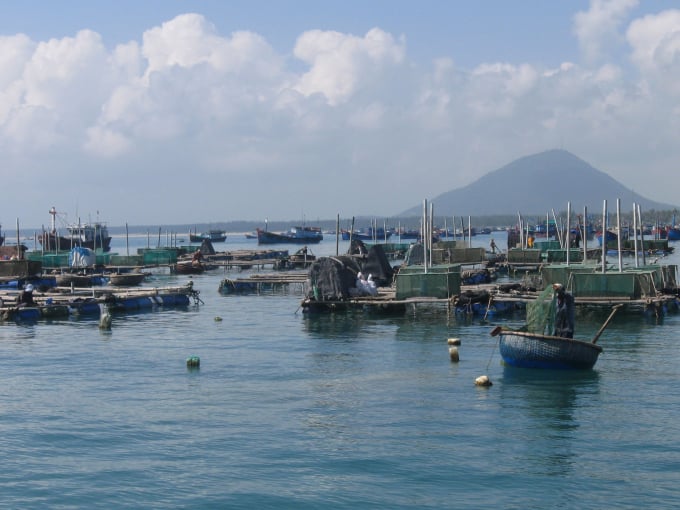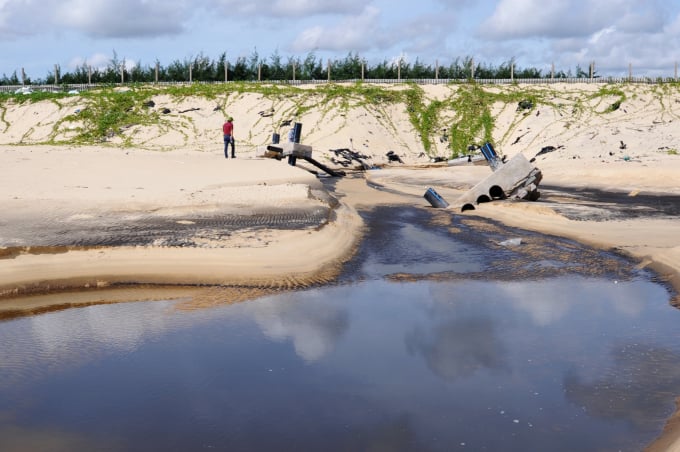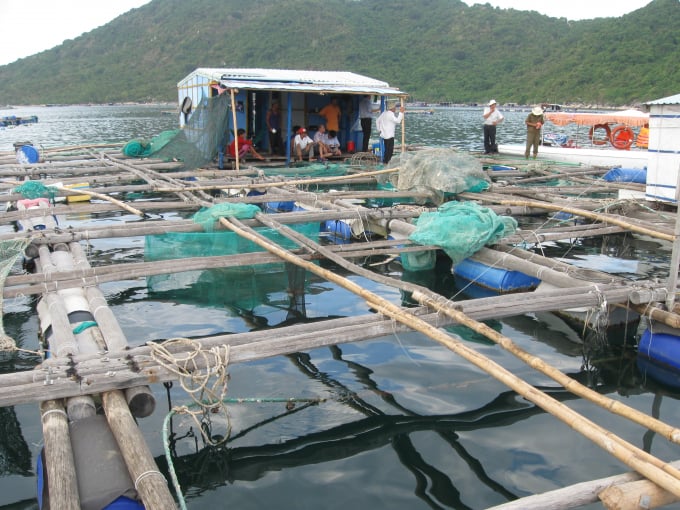May 24, 2025 | 16:27 GMT +7
May 24, 2025 | 16:27 GMT +7
Hotline: 0913.378.918
May 24, 2025 | 16:27 GMT +7
Hotline: 0913.378.918
Phu Yen has a 189km coastline and over 21,000ha of water surface in lagoons, bays, tidal flats, estuaries, etc., which is very convenient for developing fisheries in general, and aquaculture in particular. Especially, this province has thousands of ha of the open-sea near and far from the coast with great potential for the development of industrial aquaculture.

Lobster breeding is thriving strongly in Phu Yen. Photo: KS.
According to Phu Yen’s Department of Agriculture and Rural Development (DARD), aquaculture by cages and rafts on the sea started in the province during the 1990s and now has developed to more than 1,600ha of water surface. The targeted aquacultural products include lobsters and many species of fish. Lobster farming areas are concentrated mainly in lagoons and bays such as Xuan Dai, Cu Mong (Song Cau town), and coastal open sea areas in An Ninh Dong, An Hoa, An Hai and An Chan communes (Tuy An district), and Vung Ro Bay (Dong Hoa town).
Phu Yen currently has about 2,000ha of breeding ponds mainly for raising species such as black tiger shrimp, white leg shrimp, sea fish, snails, and crabs. The province's total annual aquaculture output is about 14,000 tons, of which 70% is from white leg shrimp while the remaining is from black tiger shrimp, lobster, and sea fish.
However, besides advantages, Phu Yên’s DARD reported the provincial marine aquaculture industry still faces numerous obstacles and limitations.

A high density of raising cages in bays is hiding risks of diseases and environmental pollution. Photo: MH.
Specifically, since the national plannings for sectoral and provincial development under the Planning Law 2017 have not been approved, it is the main “knot” of the legal basis for the arrangement, management, and assignment of water surface and sea areas for organizations and individuals to take part in aquaculture.
State management in local land use and construction is still weak paying the way for some households to spontaneously install cages and encroach water areas for aquaculture. The illegal construction of houses along the lagoon has also lasted for many years but has not been regularly and drastically inspected, handled, and prevented promptly.
Infrastructure in most of the farming areas has not been invested or synchronized so over the years, they have been degraded, damaged, and no longer effective. Essential infrastructure such as irrigation, water supply, and drainage systems, water treatment, roads connecting farming areas with the market has also not been properly invested. Most of the ponds do not have waste and wastewater treatment facilities so they cause environmental pollution and lack of unsustainability.

In the process of aquaculture, enterprises are not aware of environmental protection. Photo: KS.
In addition, many businesses, producers, and a majority of farmers have not improved their awareness about the aquacultural law so they do not voluntarily protect the environment for the common benefits of society.
Moreover, as shrimp farming is bringing high economic efficiency, many locals illegally expand and encroach the land to build shrimp ponds not to follow the authority’s development plan. Violations of environmental law and illegal water encroachments have not been handled resolutely and effectively.
To overcome the situation, Mr. Nguyen Tri Phuong, Deputy Director of Phu Yen’s DARD said the unit has advised the Provincial People's Committee to issue plan No. 44/KH-UBND dated 25 February 2020 and plan 190/KH-UBND on solving shortcomings and limitations in leadership, direction, and implementation of aquaculture planning in the province following a Conclusion 360- KL/TU dated November 22, 2019, of the Provincial Standing Party Committee.

Phu Yen province has a lot of potential for aquaculture development. Photo: KS.
Accordingly, the Committee assigns tasks to departments and local authorities to immediately rearrange aquaculture cages and rafts in their management areas. The tasks are now being implemented.
In addition, it is developing a master plan on aquaculture development in period 2021 - 2025, and orientation by 2030 with the goal to ensure an appropriate arrangement and restructure promoting the most potential for aquaculture in the province so that to get high efficiency, sustainability, and harmony with the development of other economic sectors such as tourism and energy.
According to Mr. Phuong, aquaculture is a strength of Phu Yen, but it has also posed numerous risks for the environment and natural landscape, and other economic sectors. To gradually improve the environment of lagoons, bays, and farming areas as well as to be able to develop sustainably and harmoniously with other economic sectors, the Committee has directed localities and related agencies to focus on deploying many urgent and long-term solutions.
Urgent solutions are being implemented including a review and completion of detailed plans for aquaculture development to integrate it into the provincial planning for the period 2021-2030, and with a vision to 2050. Along with that, investing in upgrading infrastructure for farming areas to ensure the application of advanced models (VietGAP, Global-GAP...) and high-tech farming.
The province should strengthen its aquaculture management activities, especially those in cages and rafts on lagoons and bays at the same time control the quality of seed, feed, disease and environment.

Phu Yen will rearrange the breeding cages and rafts to reduce the risks for lagoons and bays. Photo: MH.
In its master plan of socio-economic development for the period of 2021-2030, with a vision to 2050, the province targets to use about 1,000ha of the open-sea, 6-10ha of onshore area in Song Cau town; 3-5 ha in An Hai commune, Tuy An district for investment in wharves and other auxiliary works (production, nursery, storage of supplies and goods, etc.) to connect with the industrial marine farming project.
To strongly and sustainably develop the aquaculture industry making a contribution to the growth of the seafood industry in particular and the marine economy in general, Mr. Nguyen Tri Phuong, Deputy Director of Phu Yen’s DARD, recommended the Government to study and promulgate policies to support infrastructure investments and offer preferential credit programs to encourage and create favorable conditions for organizations and individuals to participate in high-tech aquaculture, especially in large-scale production of the open sea industry.
Translated by Linh Nguyen

(VAN) The mutual export of agrifood products between the European Union (EU) and the United Kingdom (UK) must occur again without certification, border controls or other red tape. This was agreed at the UK-EU summit.
/2025/05/22/5121-2-173645_677.jpg)
(VAN) NBSAP Tracker identifies strengths and areas for improvement in the National Biodiversity Strategy, based on each region’s priorities and capacities.

(VAN) The draft amendment to the Circular on rice export trading stipulates a periodic reporting regime for rice exporting enterprises.

(VAN) Dong Thap farmers attained an average profit margin of 64% during the summer-autumn 2024 crop (first season), while An Giang and Kien Giang farmers followed with 56% and 54%, respectively.

(VAN) As a doctoral student doing research on renewable energy and electrification at Harvard University, the author shares his musings on electricity, nature, and countryside memories.

(VAN) The decree on Extended Producer Responsibility (EPR) ensures transparent management and disbursement of support funds, avoiding the creation of a “give-and-take” mechanism.

(VAN) Hue City rigorously enforces regulations regarding marine fishing and resource exploitation, with a particular emphasis on the monitoring of fishing vessels to prevent illegal, unreported, and unregulated (IUU) fishing.